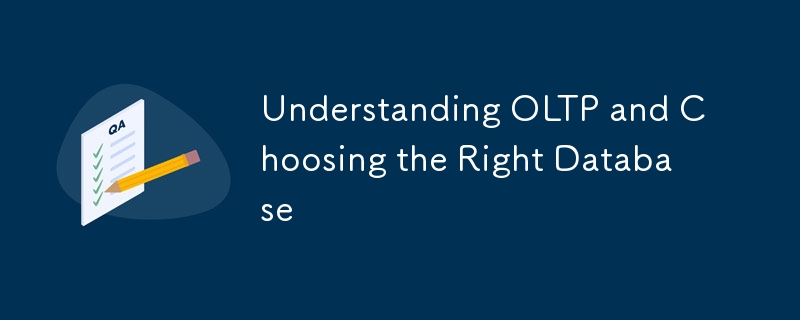
線上事務處理(OLTP)是指設計用於管理以事務為導向的應用程式的一類系統。這些應用程式的典型特點是頻繁、即時的資料輸入和檢索操作。 OLTP 系統的範例包括電子商務平台、金融服務、訂票系統等。 OLTP 系統需要能夠處理大容量查詢的資料庫,即使在數百或數千個事務同時發生的情況下也能確保資料的一致性和可靠性。
OLTP 資料庫對於此類系統至關重要,因為它支援快速建立、讀取、更新和刪除 (CRUD) 記錄。資料庫必須確保 ACID(原子性、一致性、隔離性、持久性)合規性,才能在不遺失資料完整性的情況下處理這些操作。
在本部落格中,我們將探討如何選擇正確的 OLTP 資料庫、開源生態系統中可用的選項及其優缺點。
選擇正確的 OLTP 資料庫對於任何企業來說都是一個關鍵決策,因為它會影響效能、可擴展性和資料完整性。以下是一些需要考慮的因素:
有許多開源資料庫因其在 OLTP 系統中強大的效能和可擴展性而受到歡迎。讓我們討論一些最好的開源選項及其優缺點。
概述:PostgreSQL 是最受歡迎的開源關聯式資料庫之一。 PostgreSQL 以其穩健性和可擴展性而聞名,支援 JSON 儲存、自訂資料類型和索引等高級功能。
優點:
缺點:
最佳用例:銀行系統、金融應用程式、SaaS 平台、CRM 系統。
概述:MySQL是另一个著名的开源关系数据库。 MariaDB 是 MySQL 的一个分支,由于其开源友好的性质和性能改进而越来越受欢迎。
优点:
缺点:
最佳用例:电子商务平台、内容管理系统和简单的金融应用程序。
概述:CockroachDB 是一个开源分布式 SQL 数据库,专为高可用性和水平扩展而设计。它为分布式事务提供了强大的 ACID 保证。
优点:
缺点:
最佳用例:全球事务系统、分布式应用程序和云原生服务。
概述:MongoDB 是一个 NoSQL 数据库,在其后续版本(从 4.0 版本开始)增加了对多文档 ACID 事务的支持。这使其成为某些 OLTP 用例的候选者。
优点:
缺点:
最佳用例:具有灵活架构要求或部分 OLTP 工作负载的应用程序,例如电子商务目录或内容管理系统。
| Database | ACID Compliance | Performance | Scalability | Ease of Use | Best Use Cases |
|---|---|---|---|---|---|
| PostgreSQL | Full | High | Vertical/Horizontal | Moderate | Financial systems, CRM, ERP |
| MySQL/MariaDB | Full (InnoDB engine) | High | Vertical | Easy | E-commerce, CMS, small to medium systems |
| CockroachDB | Full | High | Horizontal | Moderate | Distributed/global systems, cloud-native apps |
| MongoDB | Partial | Moderate-High | Horizontal | Easy | Applications with flexible schemas, semi-OLTP |
Choosing the right OLTP database depends on your application's specific needs, including transaction volume, performance requirements, scalability, and data structure. Open-source databases like PostgreSQL, MySQL/MariaDB, CockroachDB, and MongoDB offer excellent options for handling transactional workloads, with each providing its own strengths and trade-offs.
If you need advanced features and strong ACID compliance, PostgreSQL is an excellent choice. For simpler applications with high read/write needs, MySQL/MariaDB can be a solid, cost-effective option. For globally distributed applications, CockroachDB offers cutting-edge capabilities in horizontal scaling and resilience. MongoDB, while more suited to NoSQL use cases, has emerged as a flexible choice for applications that require both transactional support and schema flexibility.
Ultimately, understanding the unique needs of your application will guide you toward the best database for your OLTP workloads.
Each platform is powerful in its own right, and the best choice ultimately depends on your specific use cases, team expertise, and long-term data strategy.
If you have any questions or experiences to share about working with these different types of OLTP DBs, tell me which one is your favorite to implement and for what kind of data, feel free to drop a comment below!
Looking to supercharge your team with a seasoned Data Engineer? Let’s connect on LinkedIn or drop me a message — I’d love to explore how I can help drive your data success!
以上是了解 OLTP 並選擇正確的資料庫的詳細內容。更多資訊請關注PHP中文網其他相關文章!




